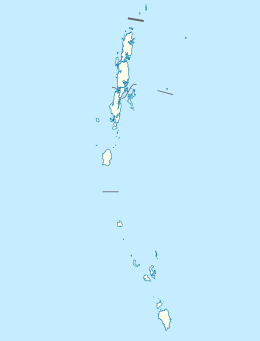Barren Island (Andaman Islands)
| Geography | |
|---|---|
| Location | Bay of Bengal |
| Coordinates | 12°17′N 93°52′E / 12.28°N 93.86°ECoordinates: 12°17′N 93°52′E / 12.28°N 93.86°E |
| Archipelago | Andaman Islands |
| Adjacent bodies of water | Indian Ocean |
| Total islands | 1 |
| Major islands |
|
| Area | 8.34 km2 (3.22 sq mi) |
| Length | 3.4 km (2.11 mi) |
| Width | 3.1 km (1.93 mi) |
| Coastline | 12.38 km (7.693 mi) |
| Highest elevation | 354 m (1,161 ft) |
| Administration | |
| District | North and Middle Andaman |
| Island group | Andaman Islands |
| Island sub-group | East Volcano Islands |
| Taluk | Rangat Taluk |
| Demographics | |
| Population | 0 (2017) |
| Pop. density | 0.00 /km2 (0 /sq mi) |
| Additional information | |
| Time zone | |
| PIN | 744202 |
| Telephone code | 031927 |
| ISO code | IN-AN-00 |
| Official website | www |
| Avg. summer temperature | 30.2 °C (86.4 °F) |
| Avg. winter temperature | 23.0 °C (73.4 °F) |
| Census Code | 35.639.0004 |
| Barren Volcano | |
|---|---|

Barren Island erupting in 1995
|
|
| Elevation | 353 metres (1,158 ft) |
| Geography | |
| Location | Andaman Islands, India |
| Geology | |
| Mountain type | Stratovolcano with pyroclastic cones |
| Last eruption | 2015 (ongoing) |
Barren Island is an island located in the Andaman Sea, dominated by Barren Volcano, the only confirmed active volcano in South Asia. and the only active volcano along a chain of volcanoes from Sumatra to Myanmar. Along with the rest of the Andaman Islands, it is a part of the Indian Union Territory of Andaman and Nicobar Islands, and lies about 138 km (86 mi) northeast of the territory's capital, Port Blair.
The first recorded eruption of the volcano dates back to 1787. Since then, the volcano has erupted more than ten times, with the most recent one being in 2017. After the first recorded eruption in 1787, further eruptions were recorded in 1789, 1795, 1803–04, and 1852. After nearly one and half century of dormancy, the island had another eruption in 1991 that lasted six months and caused considerable damage.
The 1991 eruption was particularly harmful to the island's fauna. A team from the Geological Survey of India visited Barren Island on 8-9 April 1993 to assess the impact of the eruption on the distribution, habit, and abundance of animal species. The report found that the eruption had reduced the number of bird species and their population. The team only observed 6 of the 16 known species of birds on the island. The Pied Imperial Pigeon (Ducula bicolor) was the most abundant among the 6 species observed. In a survey conducted at night, the team spotted one rat species (Rattus rattus) and 51 species of insects from eight orders. The report also noted that the volcano was still emitting gas at the time. There were eruptions in 1994–95 and 2005–07, the latter considered to be linked to the 2004 Indian Ocean earthquake. A Lighthouse that was established on 1993 was destroyed by the recent eruptions.
A team from the National Institute of Oceanography (NIO) spotted the volcano erupting on 23 January 2017. Abhay Mudholkar, the head of the team, said, "The volcano is erupting in small episodes of about five to ten minutes. During the day, only ash clouds were observed. However, after sundown, red lava fountains were spewing from the crater into the atmosphere and hot lava flowed streaming down its slopes."
...
Wikipedia

